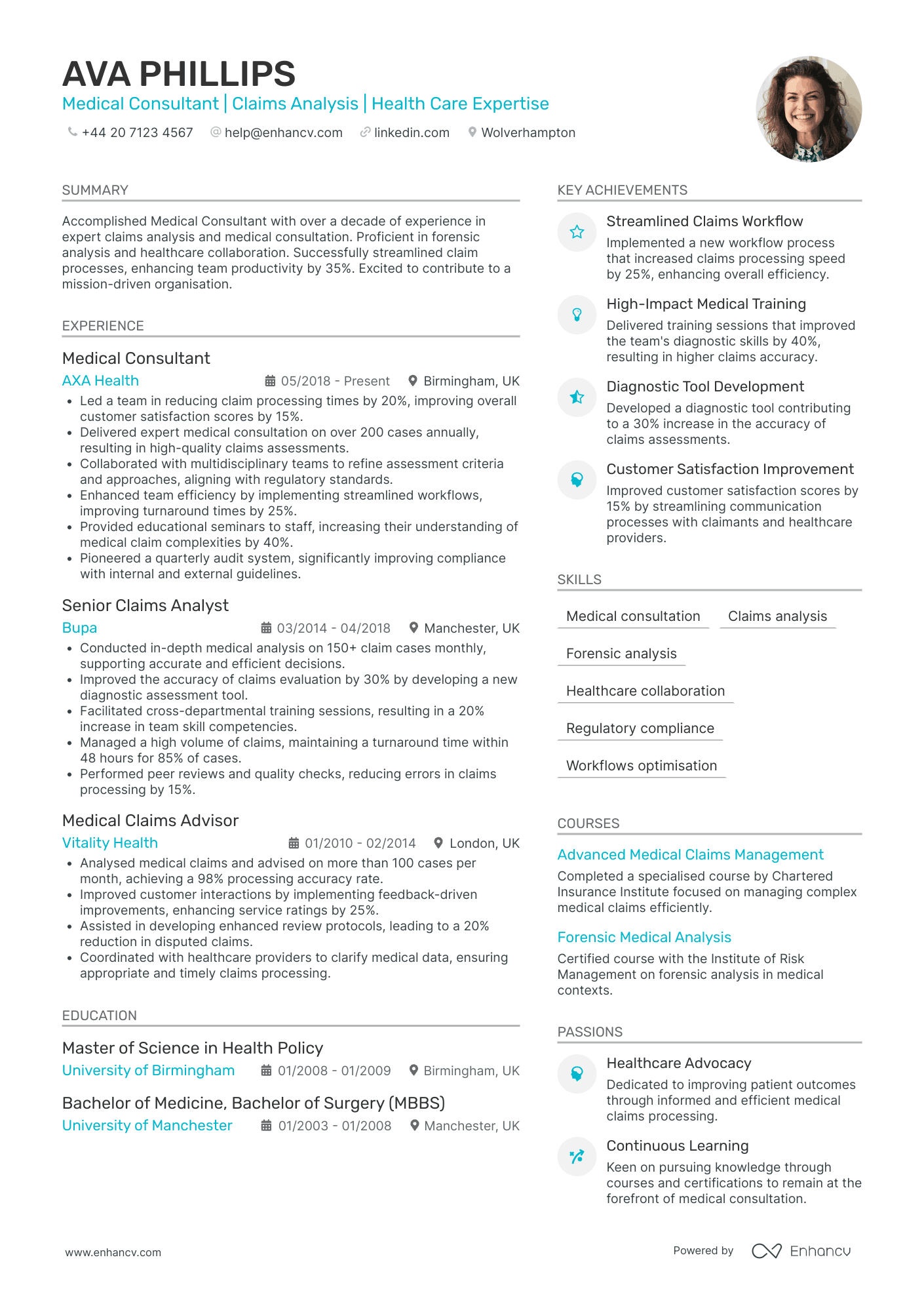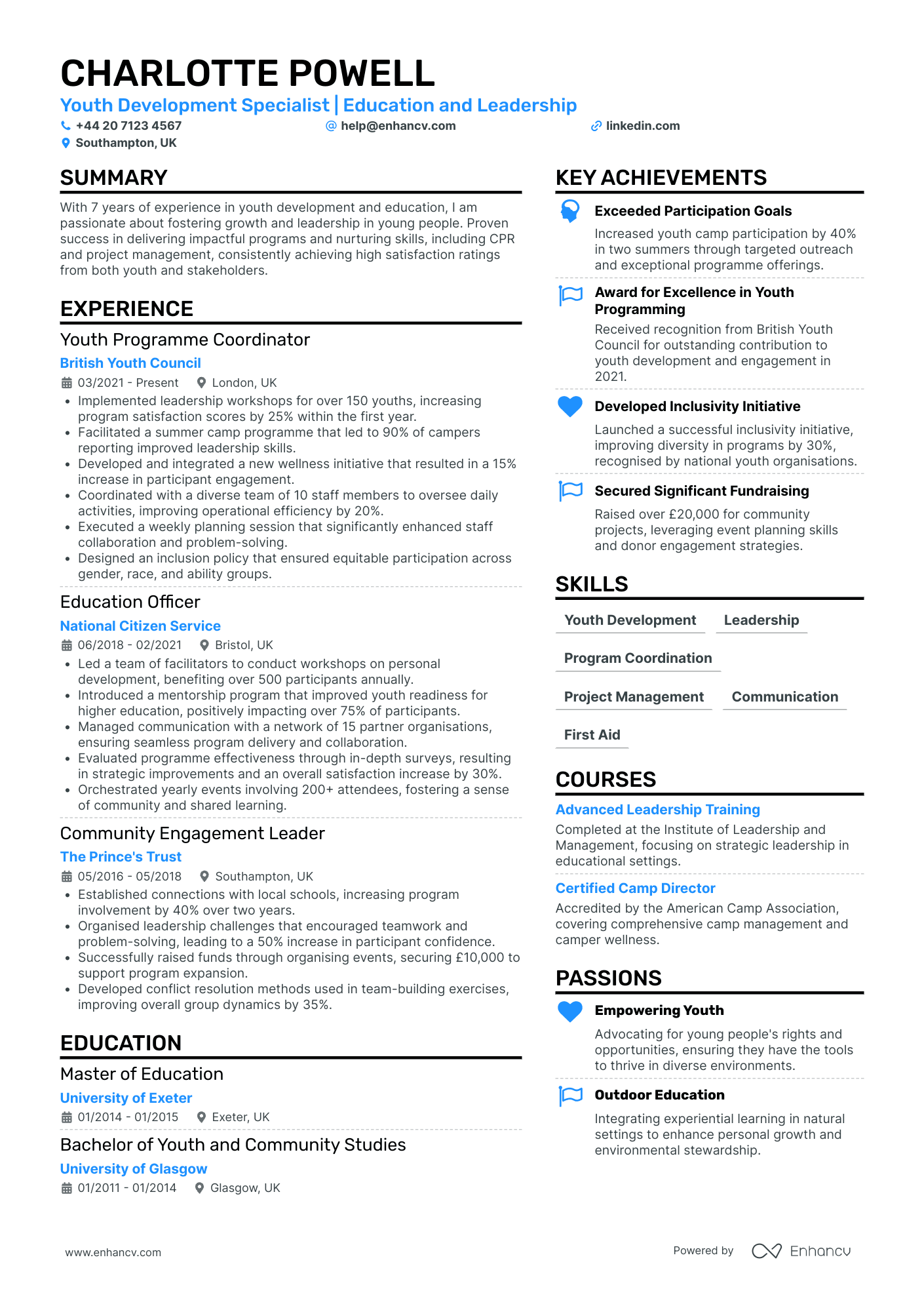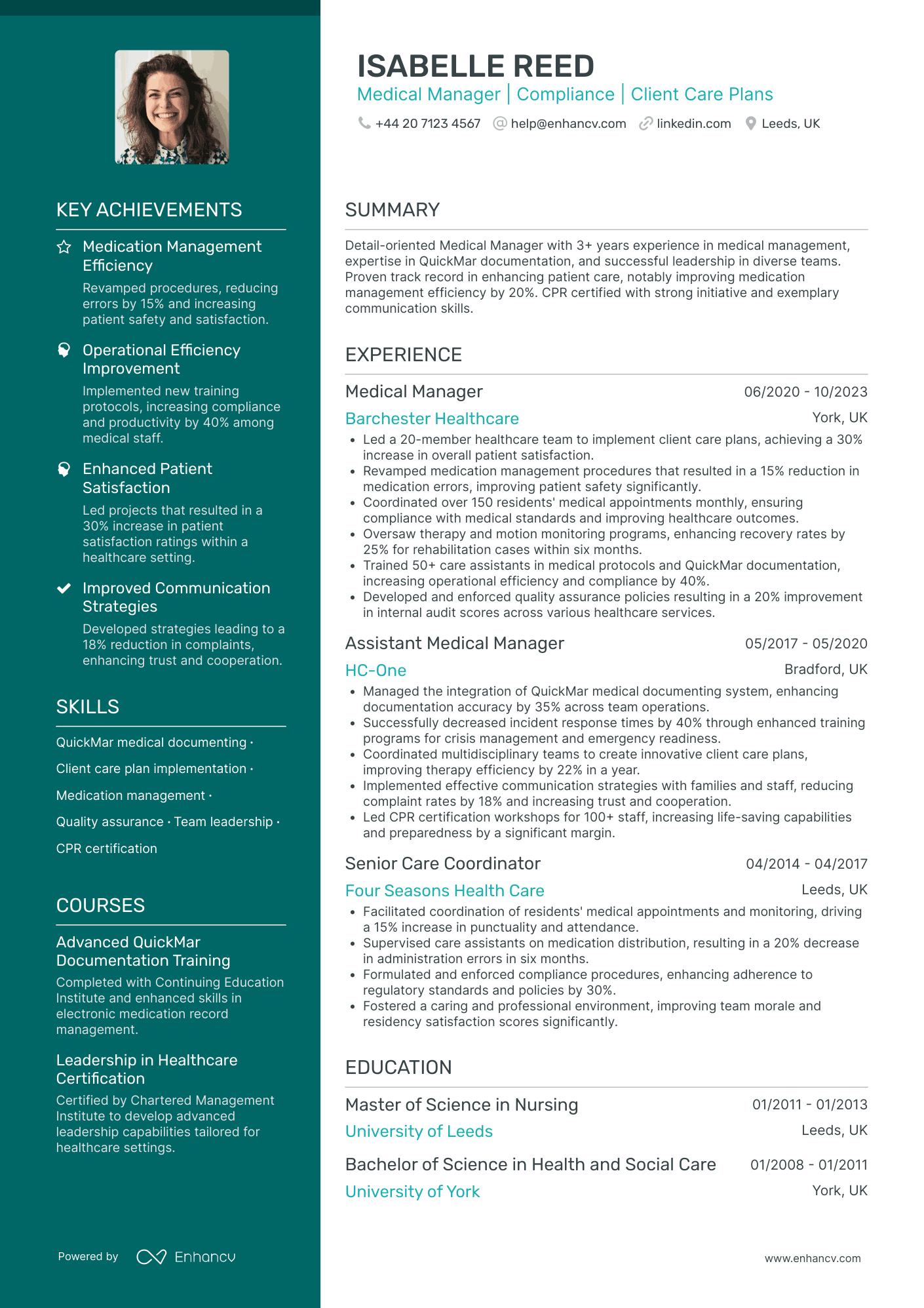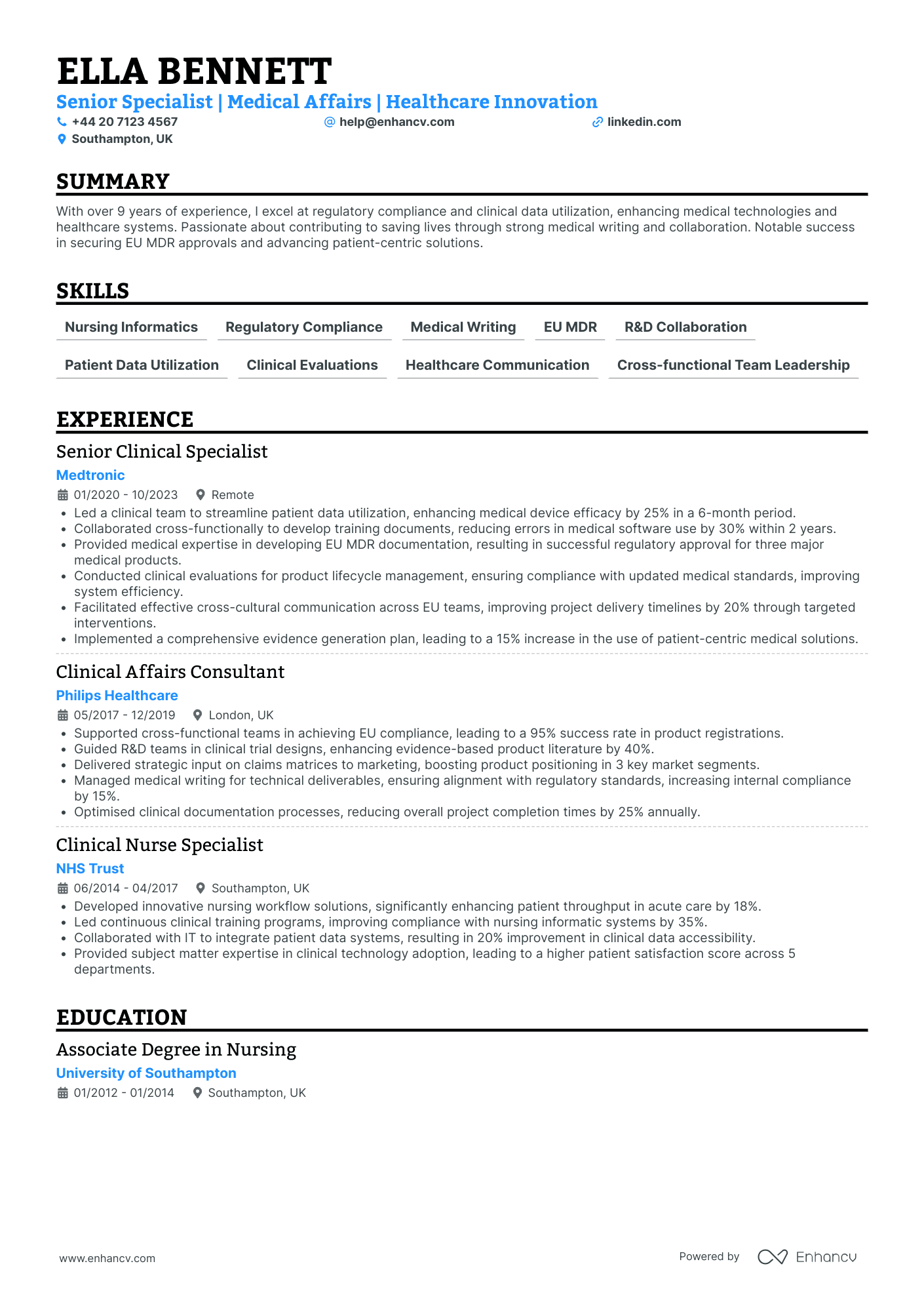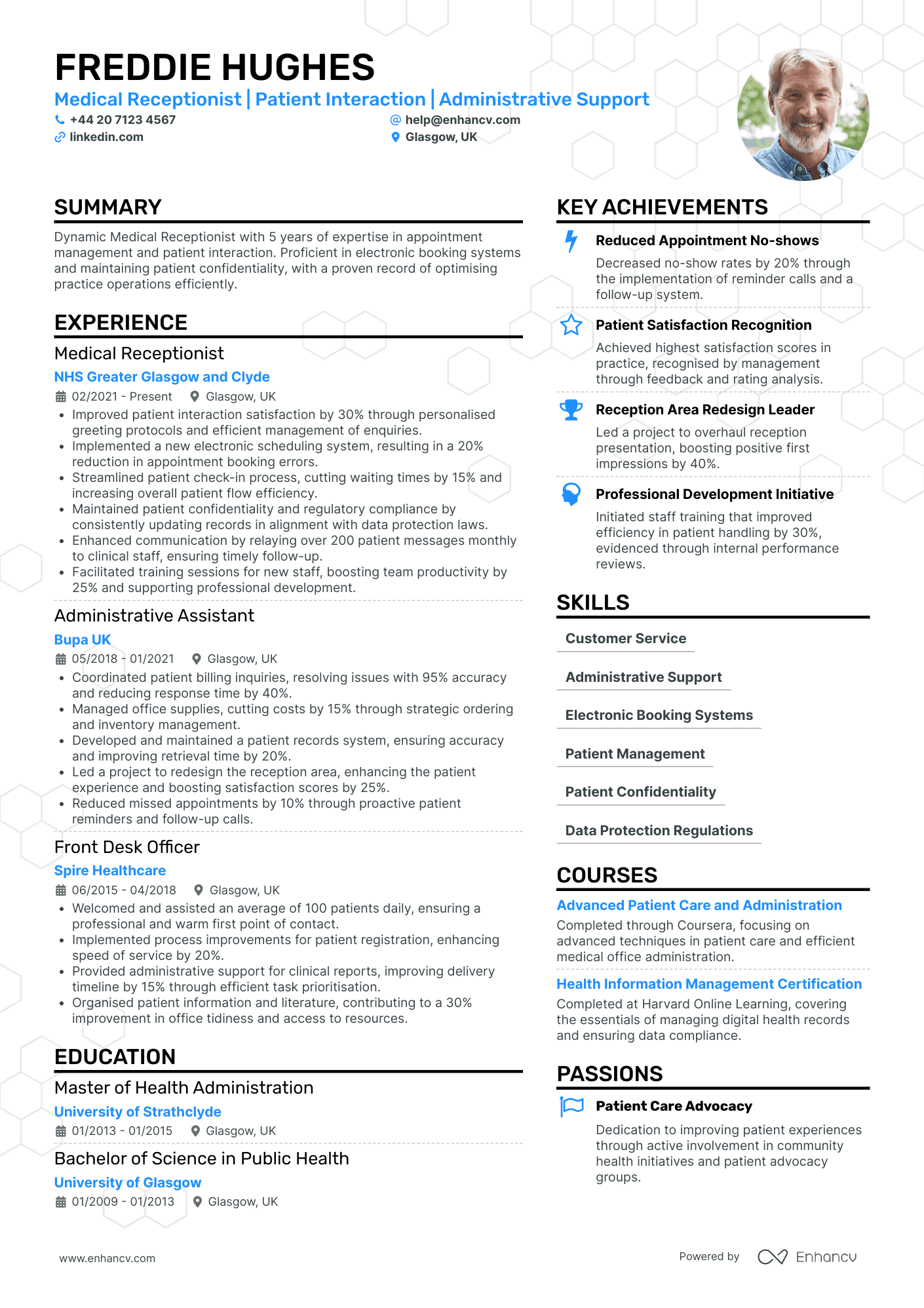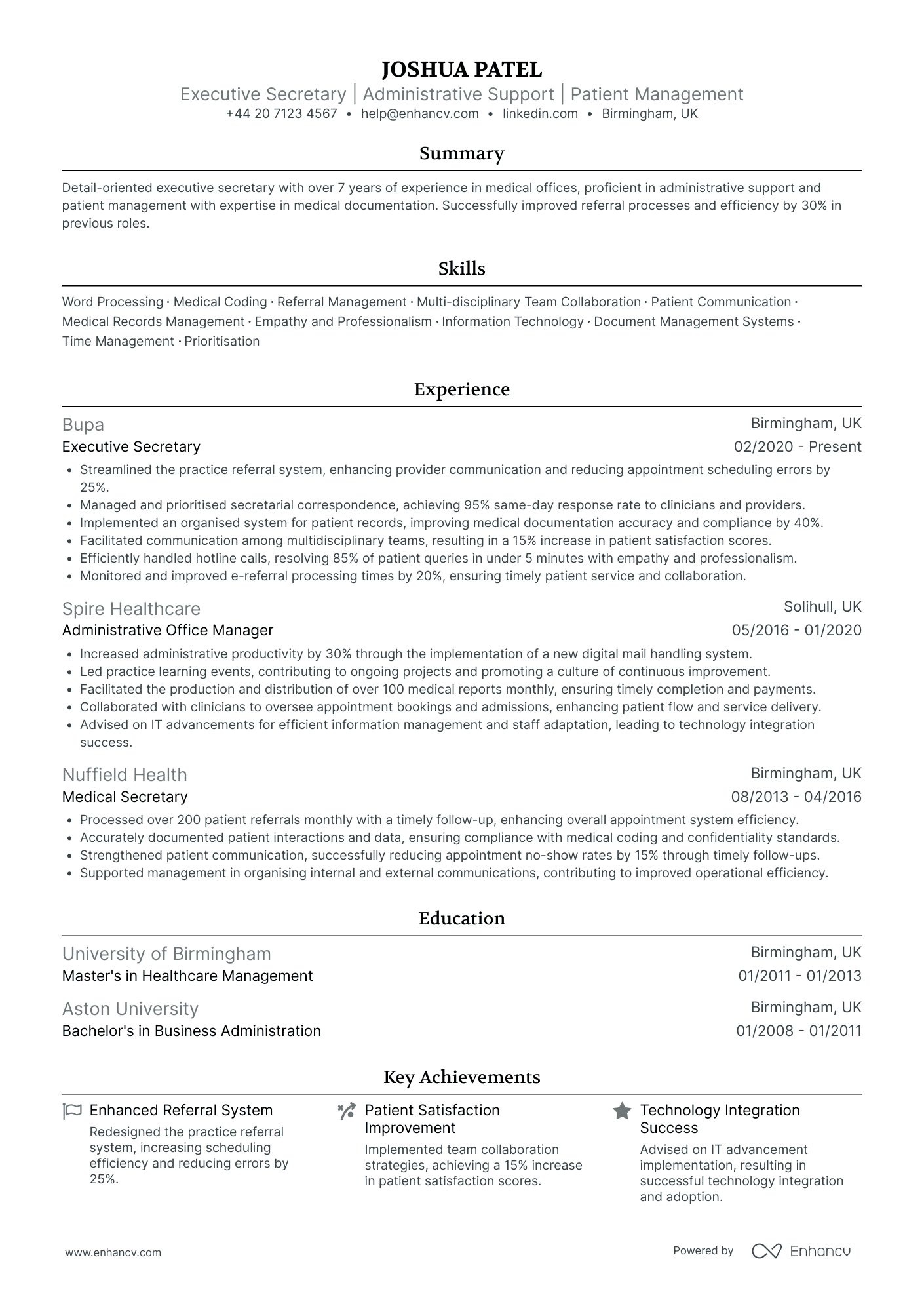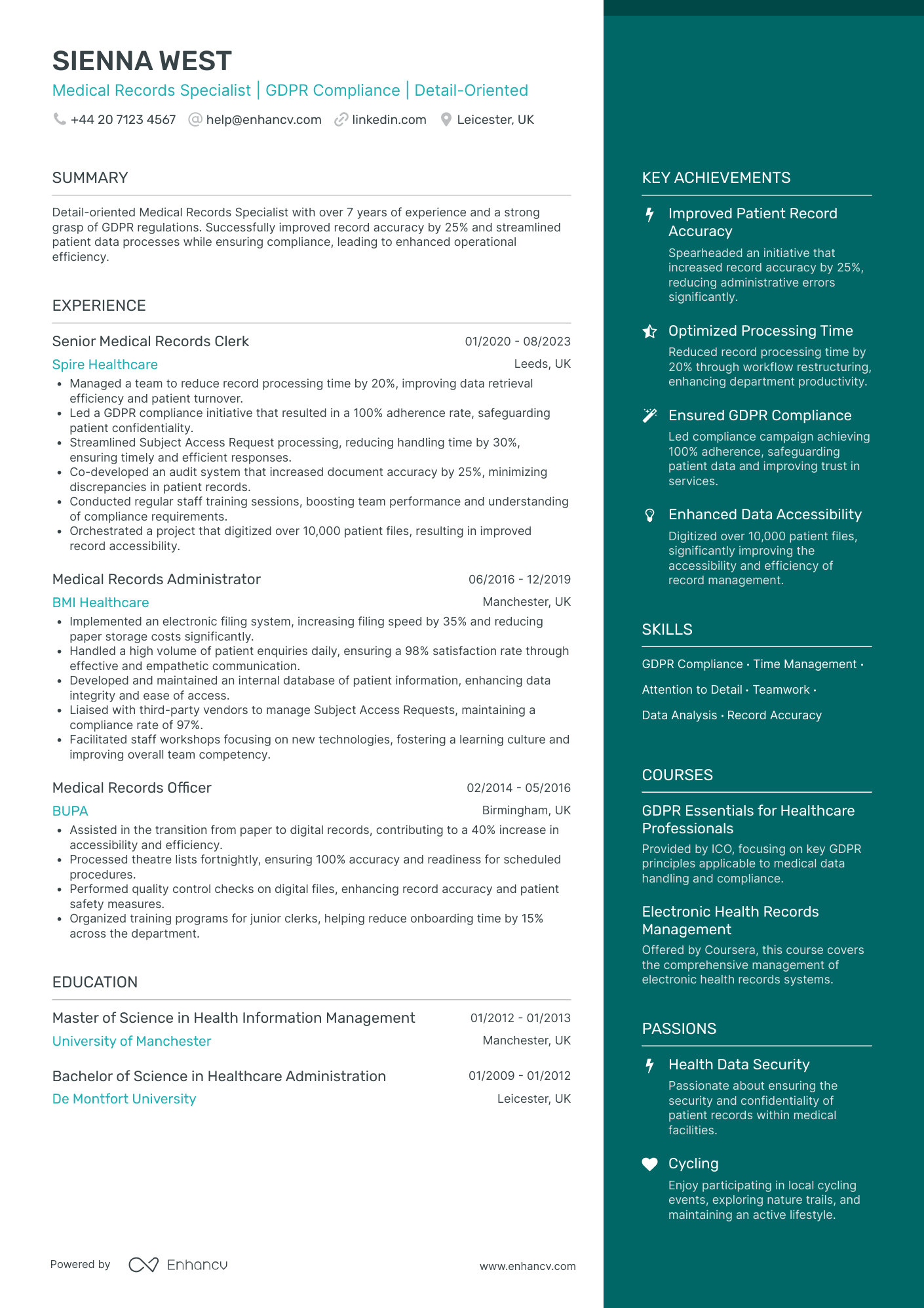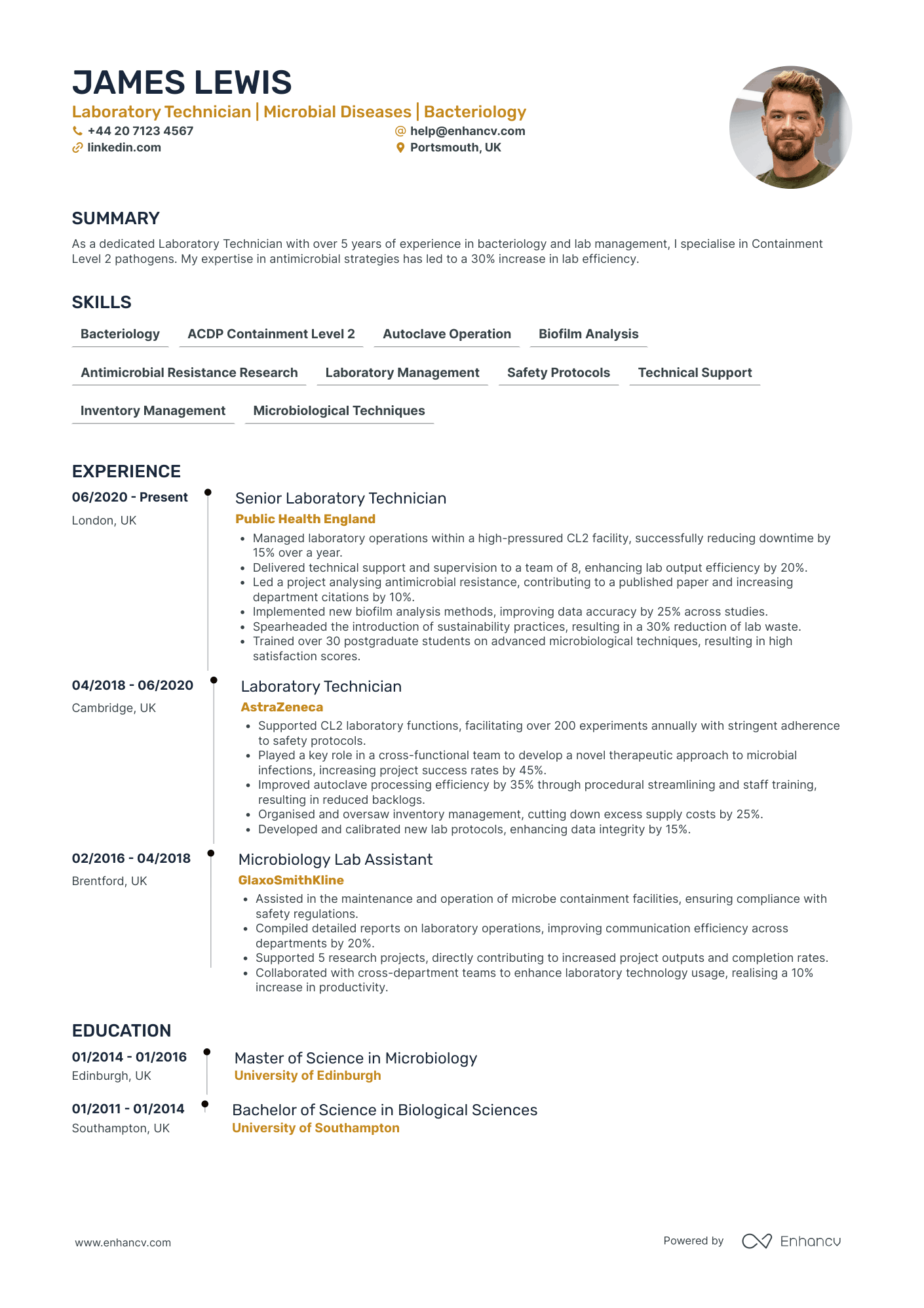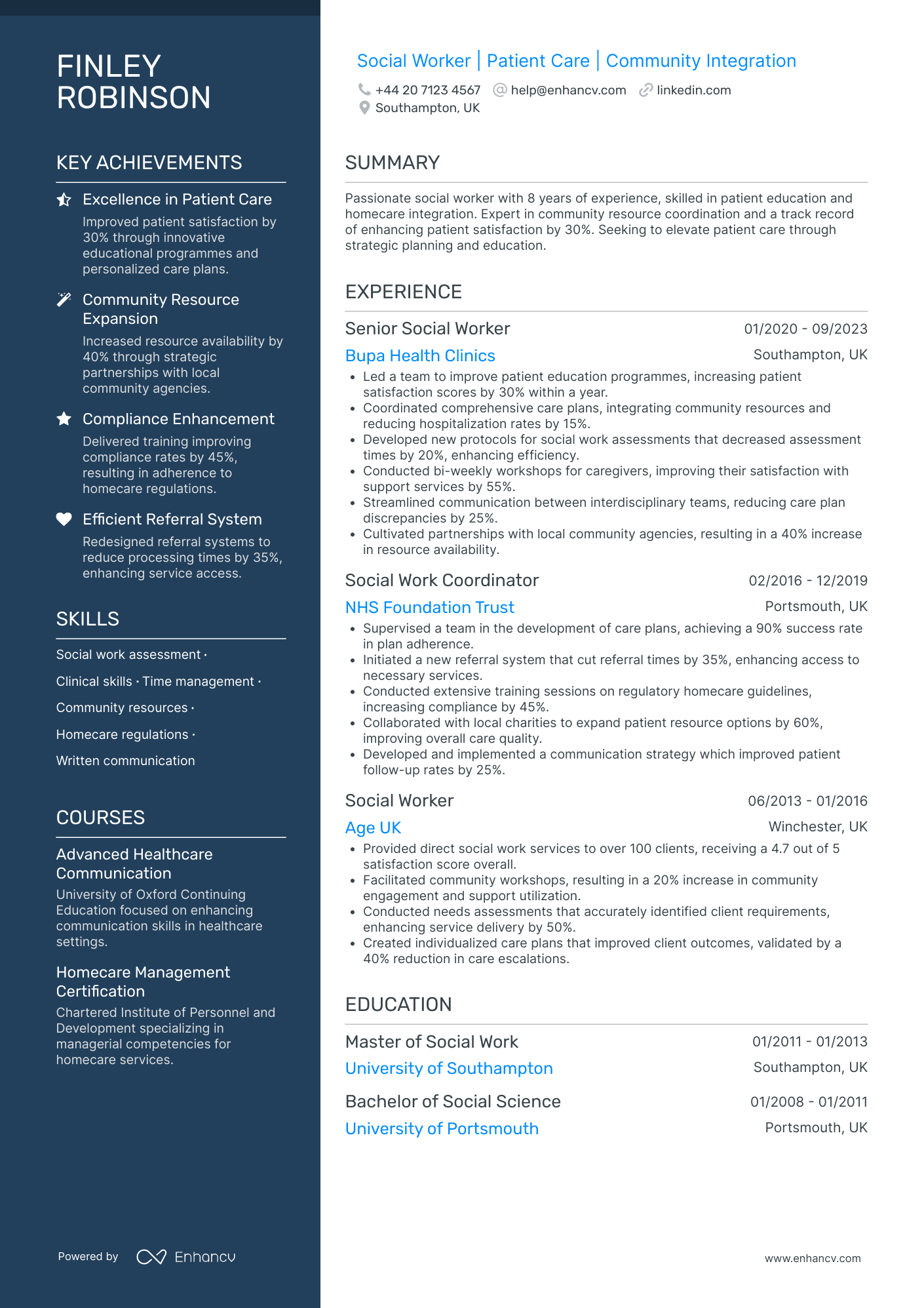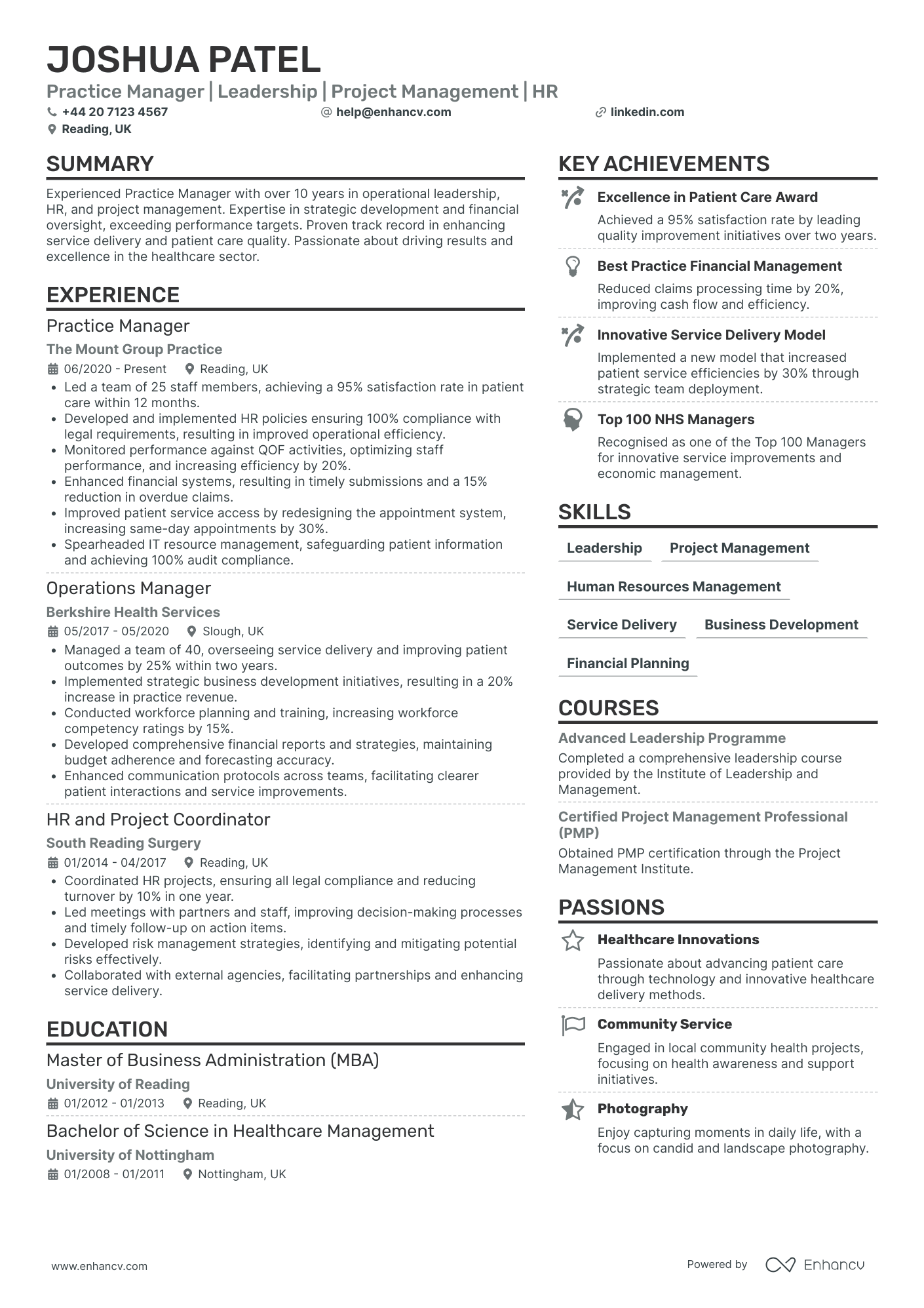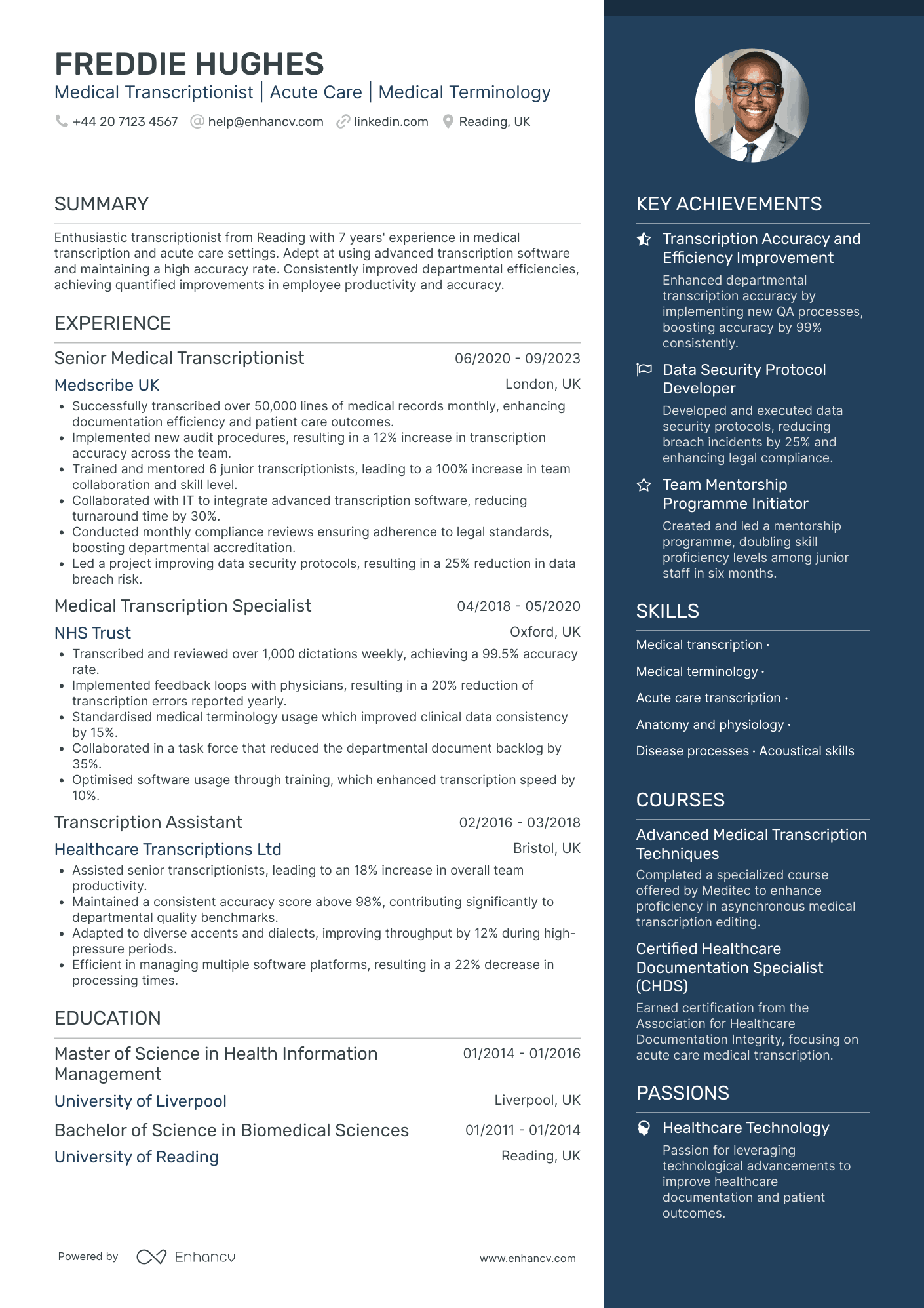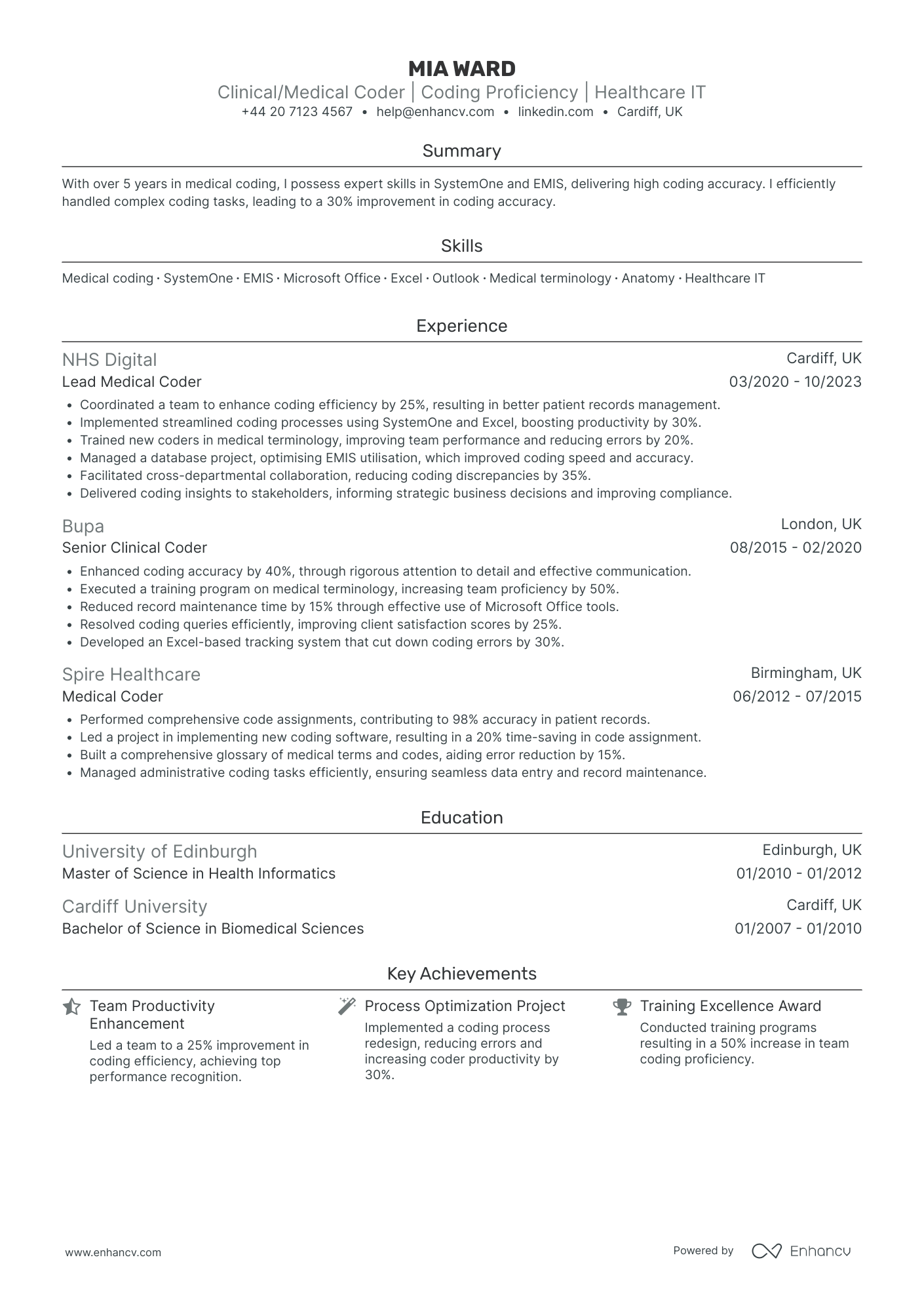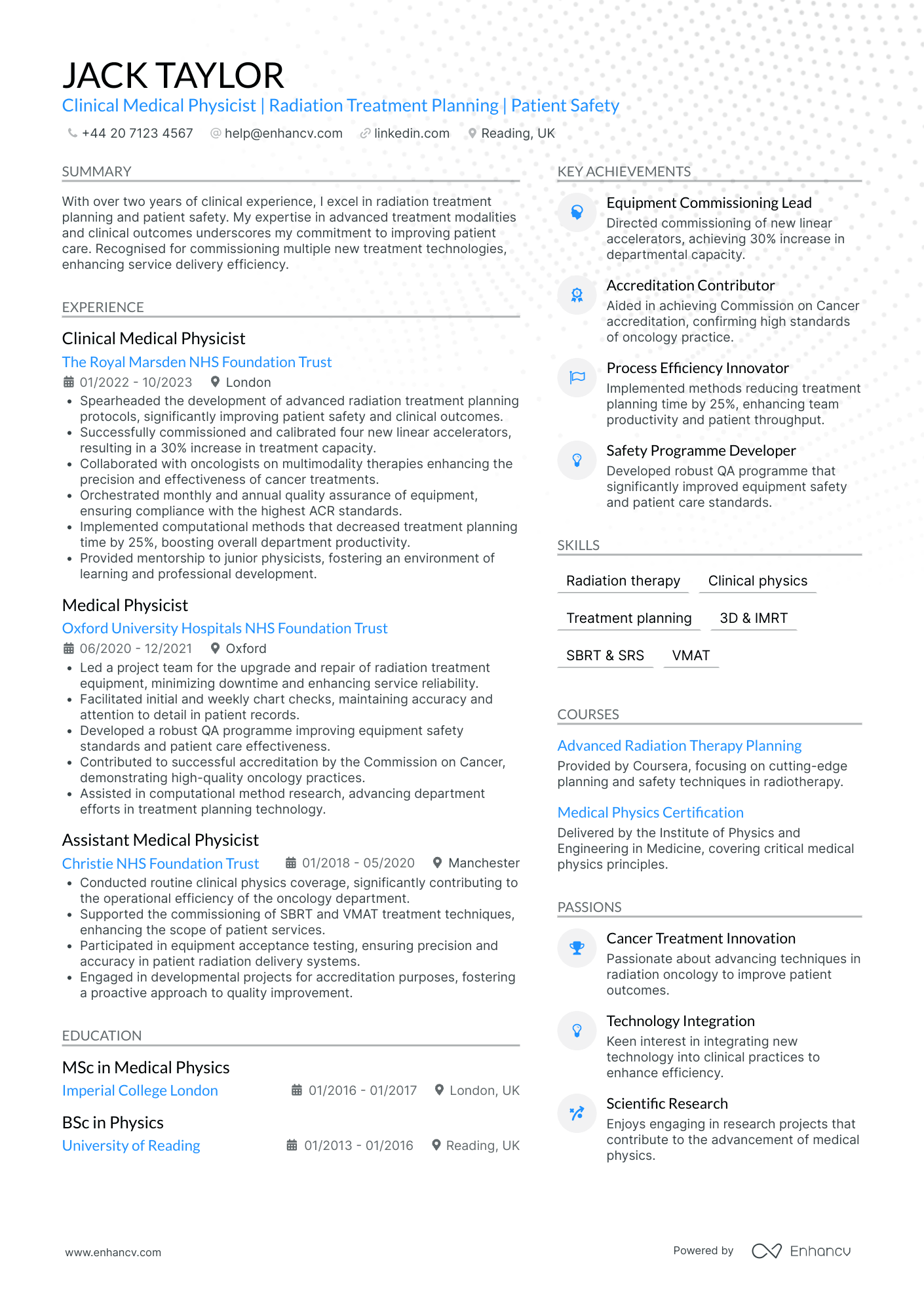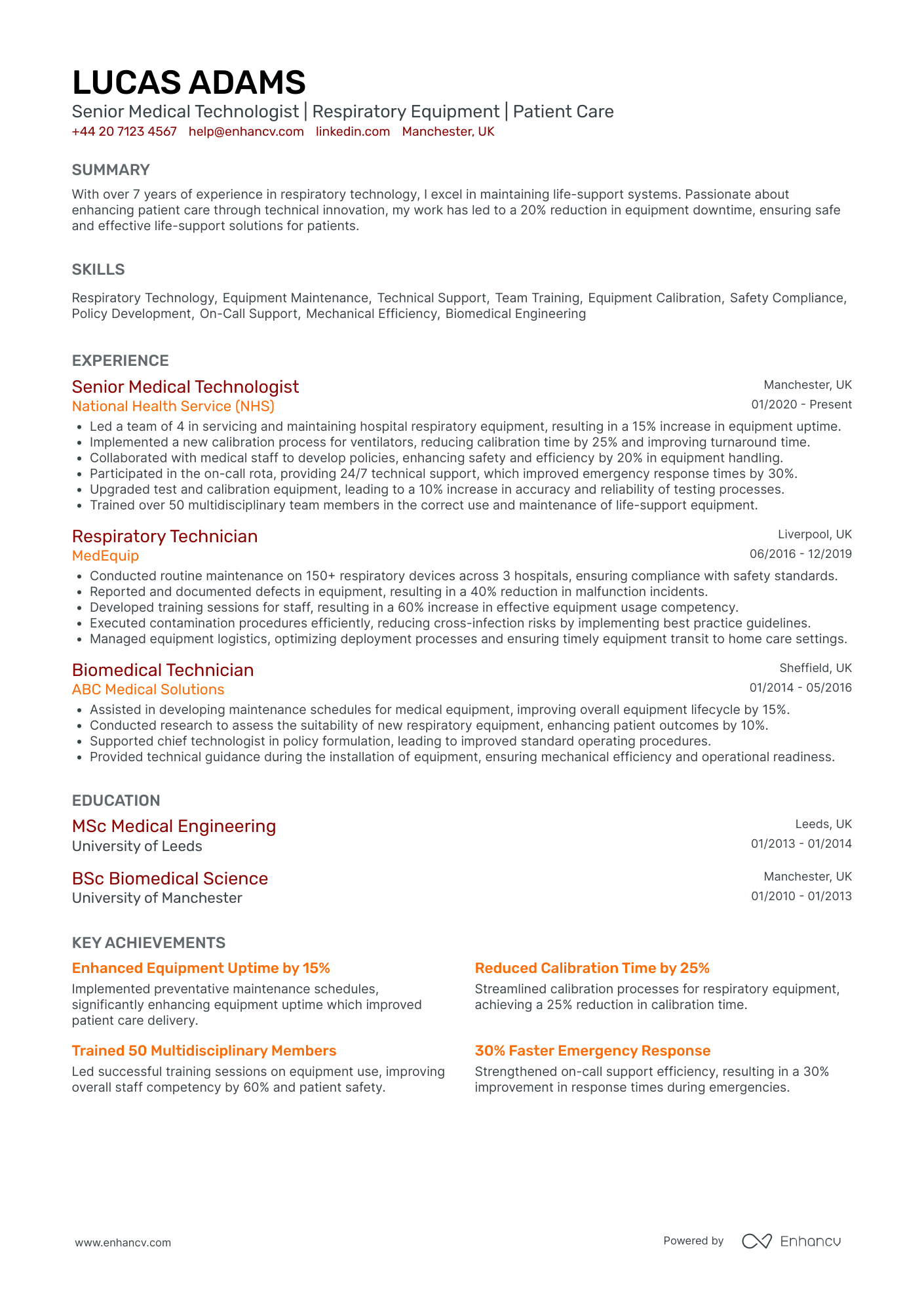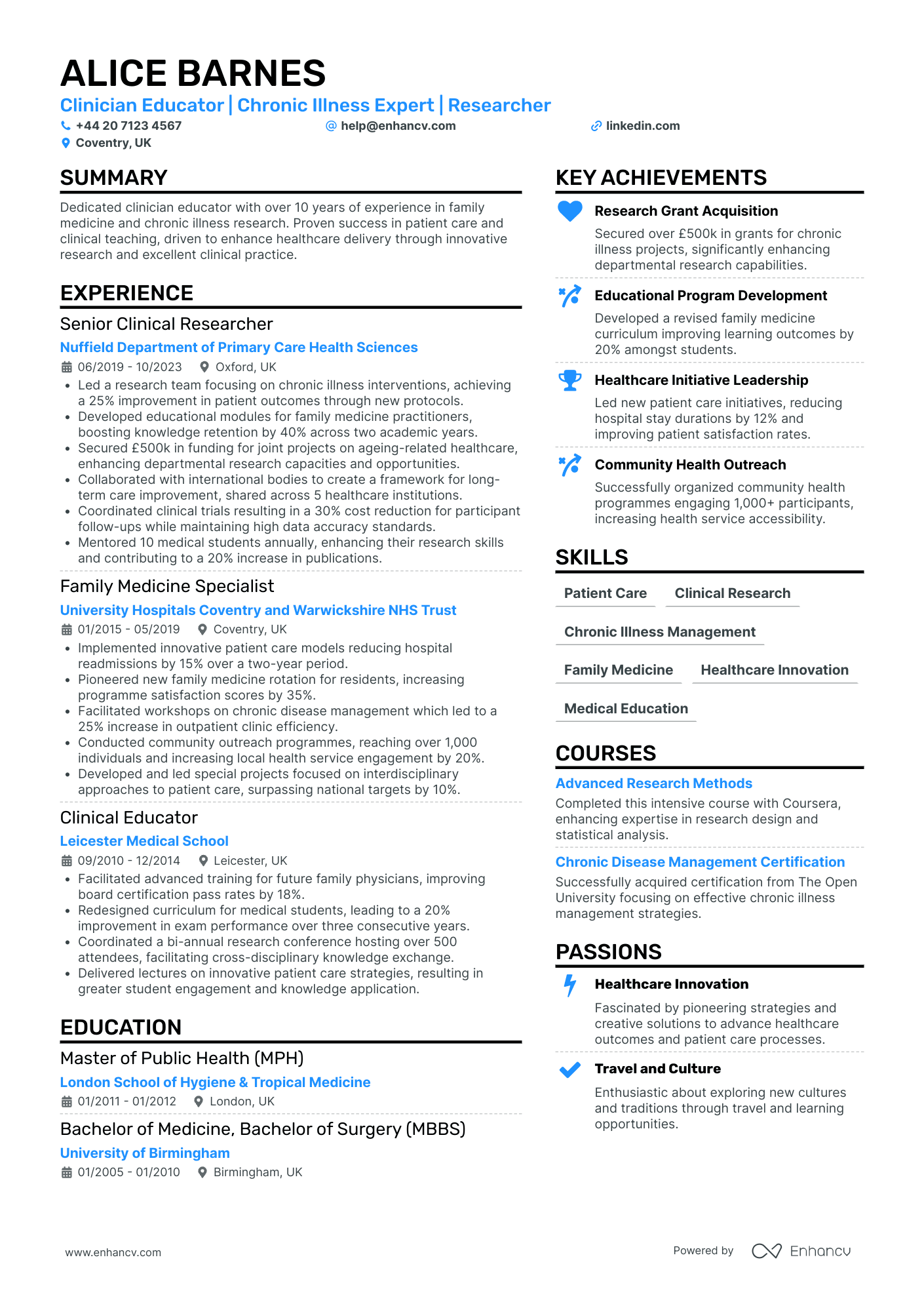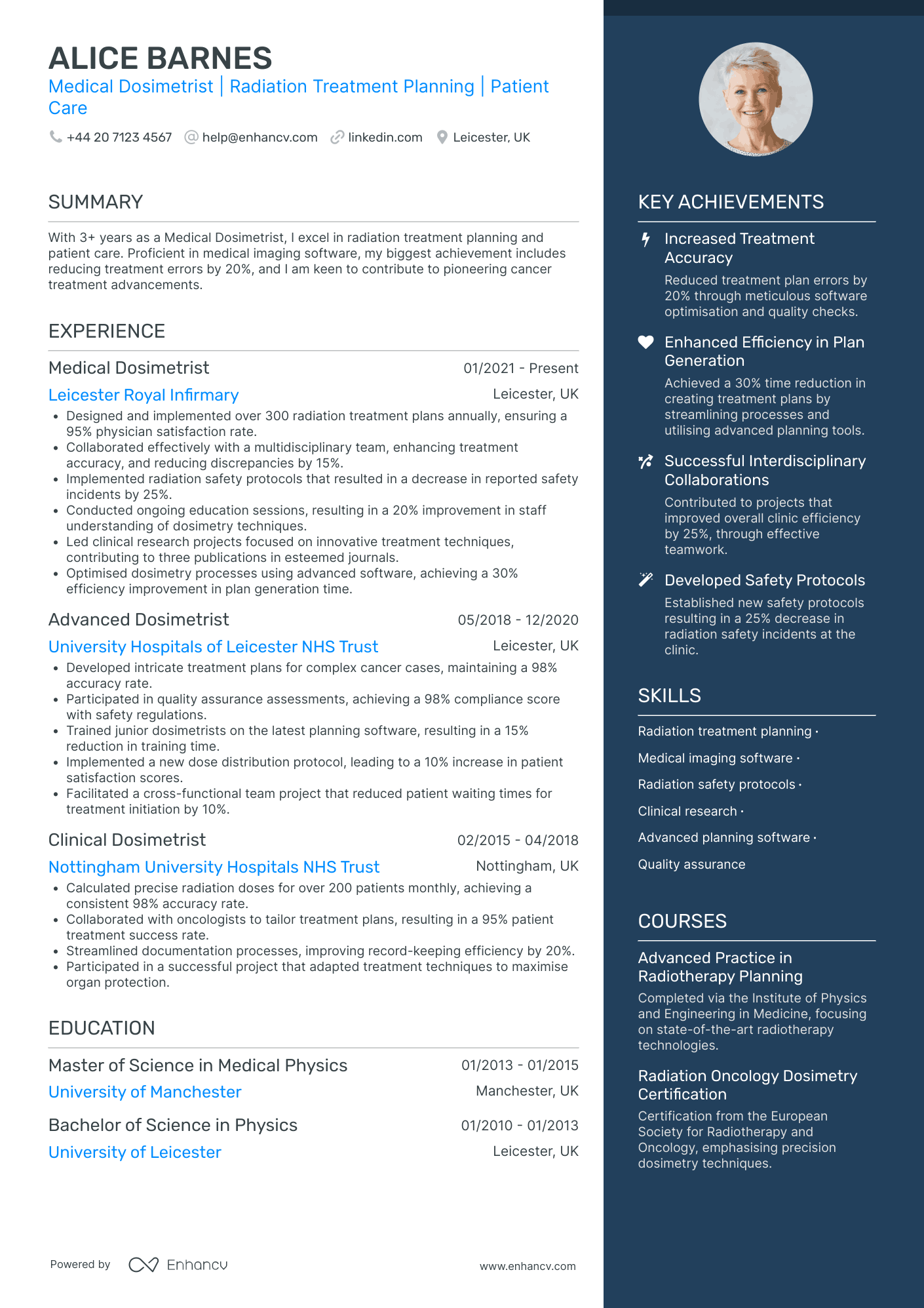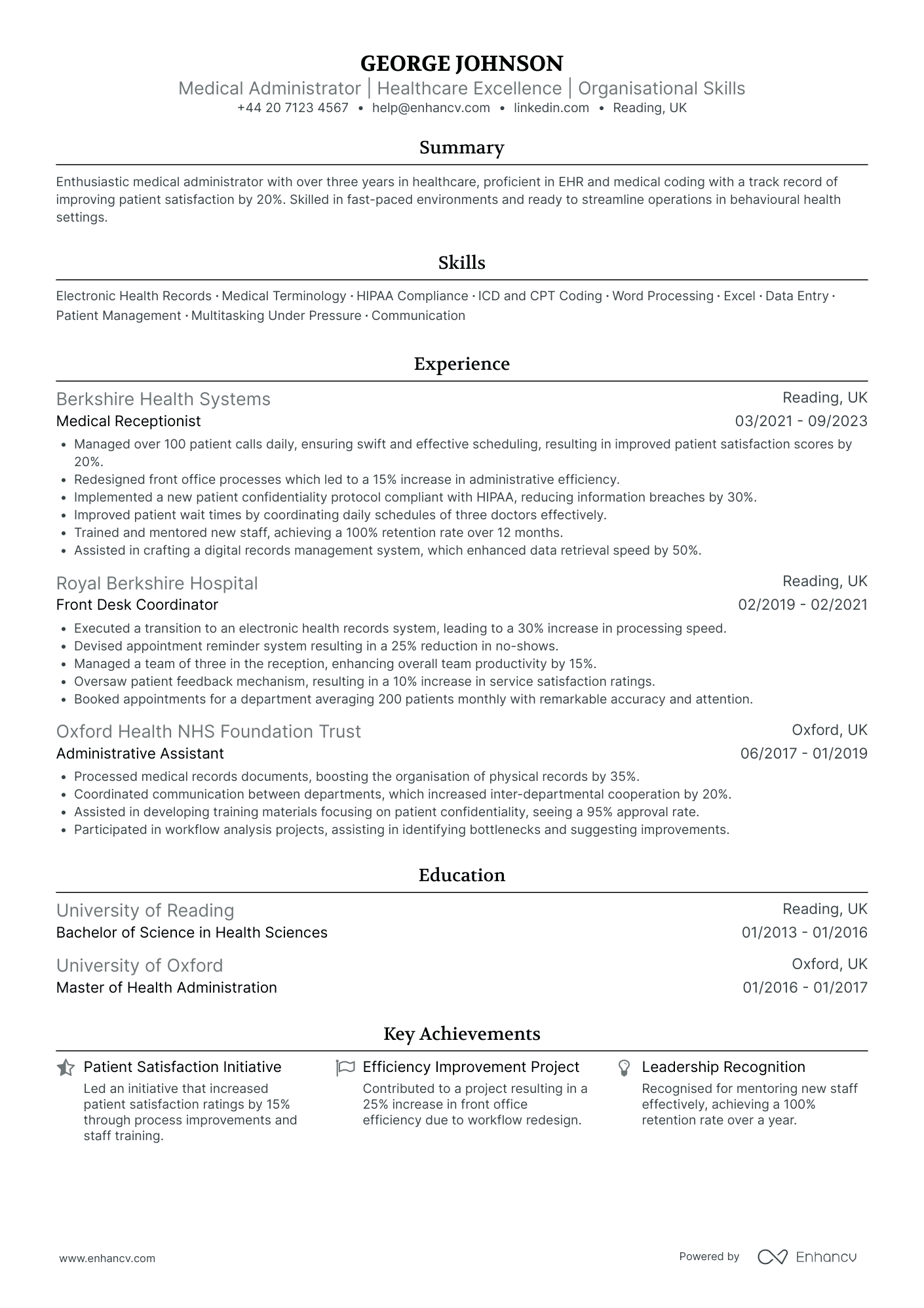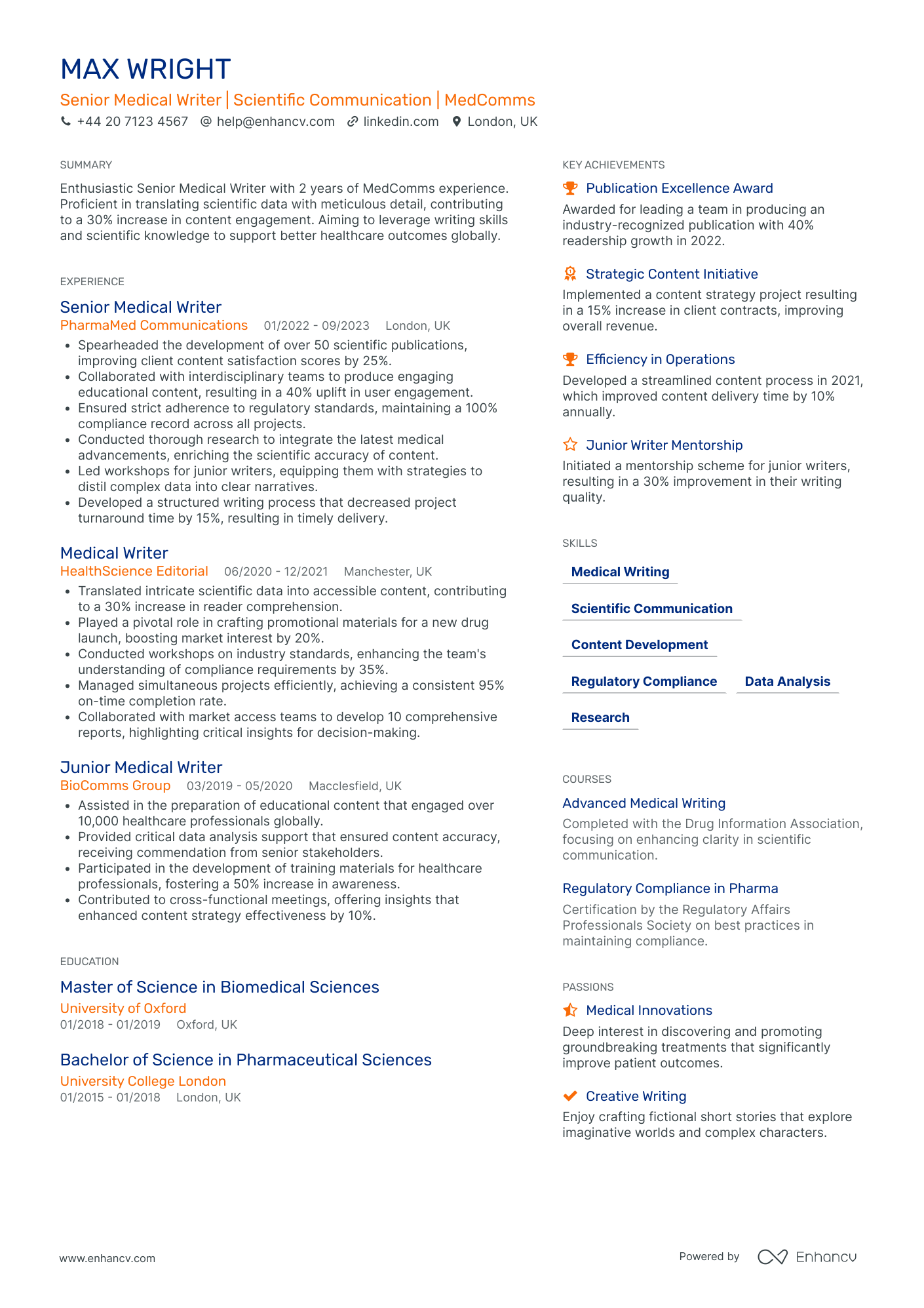One specific CV challenge faced by medical professionals is articulating the breadth of their clinical experience without overwhelming the reader with jargon. Our guide is designed to help you translate your extensive expertise into clear, impactful language that resonates with recruiters.
- Create an attention-grabbing header that integrates keywords and includes all vital information;
- Add strong action verbs and skills in your experience section, and get inspired by real-world professionals;
- List your education and relevant certification to fill in the gaps in your career history;
- Integrate both hard and soft skills all through your CV.
Discover more industry-specific guides to help you apply for any role in the links below:
Resume examples for medical
By Experience
Medical Consultant
- Clarity and Structure in Content Presentation - Ava Phillips' CV is presented with a clear, methodical structure, separating sections such as Experience, Education, Skills, and Achievements. Each position is detailed with concise bullet points, ensuring quick readability while delivering comprehensive information on her contributions and expertise.
- Demonstrated Career Growth and Industry Experience - Ava's career trajectory highlights significant growth, moving from a Medical Claims Advisor to a Medical Consultant. Her progression through reputable healthcare companies like Vitality Health, Bupa, and AXA Health reflects not only promotions but also her deepening expertise in medical claims and consultancy, underlining a continuous upward motion within the health care industry.
- Innovative Methodologies and Technical Expertise - The CV distinguishes itself by detailing industry-specific methodologies and tools such as the development of a diagnostic assessment tool and a quarterly audit system. These elements underscore Ava's capacity for innovation within the domain of medical claims analysis, demonstrating technical deep dives that add value to her roles.
Medical Director
- Clear and Structured Content Presentation - Charlotte's CV impresses with its clear structure and concise presentation. Each section is well-organized, starting with a powerful summary that sets the tone for the rest of the document. The use of bullet points ensures that key achievements and responsibilities are easily digestible, making it straightforward for hiring managers to identify her strengths in youth development and leadership.
- Diverse Career Trajectory - Charlotte's career progression reflects significant growth and responsibility within the youth development sector. From beginning as a Community Engagement Leader to her current role as a Youth Programme Coordinator, her journey showcases an increasing scope of influence and leadership. This trajectory is complemented by consistent roles that emphasize her commitment to improving educational and leadership opportunities for young people.
- Significant Achievements with Tangible Impact - The CV highlights several achievements that have had a meaningful impact, such as exceeding participation goals and raising substantial funds for community projects. These accomplishments not only demonstrate Charlotte's effectiveness in executing her roles but also underline her ability to drive substantial enhancements in program reach and financial capacity, thereby supporting long-term organizational success.
Medical Manager
- Content Presentation Reflecting Professionalism - The CV is exceptionally organized, presenting Isabelle Reed's qualifications with precision. Each section is clear and concise, making it easy for potential employers to quickly gauge her suitability for a role in medical management. The logical flow from education to experience leads the reader through her career and accomplishments seamlessly.
- Career Trajectory with Evident Growth - Isabelle's career journey demonstrates a consistent upward trajectory, illustrated by her progression from Senior Care Coordinator to Medical Manager. This evolution reflects her ability to adapt and grow within the healthcare industry, highlighting her dedication and enhancing her credibility as a medical professional.
- Achievements with Significant Business Impact - The CV effectively highlights Isabelle's achievements, focusing not just on numerical improvements but their broader implications, such as increased patient satisfaction and safety. Her initiatives in medication management and quality assurance have clearly contributed to operational enhancements and strategic success in her roles.
Medical Specialist
- Clear Structure and Conciseness - The CV showcases a well-organized structure with distinct sections, each clearly labeled such as "Experience," "Education," and "Skills." The concise presentation allows for efficient scanning, ensuring key information is immediately accessible to potential employers.
- Progressive Career Trajectory - Ella Bennett's career exhibits a marked progression, transitioning from a Clinical Nurse Specialist to a Senior Clinical Specialist. This upward trajectory, spanning a range of roles at different organizations, demonstrates growth in expertise and responsibility within the healthcare sector.
- Impactful Achievements - The CV highlights achievements with clear business relevance, such as securing EU MDR approvals and optimizing clinical decision-making. The inclusion of specific percentages, like improving patient data utilization by 25%, illustrates the candidate’s ability to drive significant impact within her roles.
By Role
Medical Receptionist
- Strategic approach to career growth - The CV effectively highlights the candidate's progressive career trajectory within the data science industry. From a start as a junior analyst to a senior data strategist, each role is defined by a clear increase in responsibility, reinforcing their ability to adapt and thrive amidst evolving business challenges.
- Emphasis on adaptability with cross-functional collaborations - This CV makes a point to highlight instances where the candidate successfully collaborated with product teams, engineers, and marketing professionals. Their adaptability is underlined through the ability to integrate data science insights into various aspects of a business, supporting both technological and operational objectives.
- Effective presentation of leadership and mentorship skills - The document illustrates the candidate's soft skills and leadership qualities by showcasing their involvement in mentoring junior colleagues and leading project teams. The candidate is portrayed as both a team player and an inspirational leader, capable of fostering growth and development within their team.
Medical Secretary
- Exceptional content structure and clarity - The CV is neatly organized into clearly defined sections that guide the reader through the candidate’s professional journey. Bullet points effectively summarize key responsibilities and achievements, ensuring quick readability and putting emphasis on the most important aspects of their career.
- Significant career growth and industry evolution - This CV reflects a dynamic career trajectory, showcasing a progression from entry-level roles to senior management. It highlights active industry shifts, showing how the candidate expanded their expertise by transitioning from traditional media marketing to data-driven digital marketing spaces.
- Utilization of industry-specific tools and methodologies - The document showcases a deep understanding of cutting-edge tools like HubSpot, SEMrush, and Tableau, alongside methodologies like A/B testing and agile project management. This technical depth sets the candidate apart as an innovator who remains at the forefront of industry developments.
Medical Records Clerk
- Structured Presentation - Sienna West's CV stands out for its clear and organized structure, making it easy to navigate through detailed sections of experience, education, and achievements. The concise style of each section aids the reader in quickly grasping the scope of her expertise and the value she brings as a Medical Records Specialist.
- Solid Career Progression - The career trajectory illustrated in the CV shows a progressive path from a Medical Records Officer to a Senior Medical Records Clerk in reputed healthcare organizations. This demonstrates not only her growing responsibility within similar roles but also highlights her commitment and capacity to drive initiatives in GDPR compliance and records management.
- Industry-specific Expertise - Sienna's proficiency in specialized tools and methodologies such as PAS System and SAR Processing positions her cutting-edge expertise in handling medical records. Her detailed knowledge of GDPR compliance further emphasizes her capability to manage sensitive data securely and effectively, which is crucial in her field.
Medical Laboratory Technician
- Structured Presentation with High Clarity - The CV showcases an organized layout, beginning with a succinct summary followed by detailed sections covering experience, education, skills, and more. Each section is distinctly defined, enabling easy navigation and ensuring that pertinent information is delivered clearly and concisely.
- Consistent Career Growth in Renowned Organizations - The candidate demonstrates a steady trajectory in their career, progressing from a Microbiology Lab Assistant at GlaxoSmithKline to a Senior Laboratory Technician at Public Health England. This progression underpins a dedication to their field and an accumulation of industry experience, enhancing their professional appeal in bacteriology and laboratory management.
- Industry-Specific Expertise in Advanced Bacteriology - The CV highlights specialized knowledge in handling Containment Level 2 pathogens and advanced bacteriology techniques, illustrating technical depth in a niche area of microbial research. This competency, coupled with their adeptness in implementing sustainability practices and novel methodologies, distinctly positions them within the microbiology sector.
Medical Social Worker
- Strong emphasis on adaptability and cross-functional experience - The CV shows a history of the candidate thriving in various roles and environments, leveraging diverse skills across product management, client relations, and project leadership, which indicates an ability to effectively collaborate with cross-functional teams to achieve shared goals.
- Clear focus on content presentation - The structure of the CV effectively draws attention through succinct bullet points, and organized sections that streamline information to spotlight the candidate's key qualifications and career achievements without overwhelming the reader.
- Leadership and soft skills highlighted effectively - The candidate's trajectory is marked by progressive leadership roles where teamwork and mentoring are emphasized, reflecting a strong emphasis on fostering interpersonal relationships and developing team capabilities.
Medical Practice Manager
- Comprehensive Leadership Profile - The CV excellently presents a well-rounded leadership profile, emphasizing strategic and operational capabilities in healthcare management. The structured sections highlight Joshua's role as a Practice Manager, showcasing effective team leadership and project management that directly contribute to improved patient care and operational efficiency.
- Career Progression and Operational Influence - Joshua's career trajectory demonstrates a consistent climb from HR and Project Coordinator to Practice Manager, illustrating substantial growth and a deepened influence on healthcare operational management. Each role transition is marked by increased responsibilities and notable achievements in service delivery enhancement and financial oversight.
- Achievements with Tangible Business Impact - The CV emphasizes specific, measurable achievements, such as a 95% satisfaction rate in patient care and a 20% increase in efficiency through revamped appointment systems. These accomplishments not only highlight Joshua’s strategic impact but also underline the real-world improvements in healthcare service delivery and financial management.
Medical Transcriptionist
- Effective Content Presentation - This CV is structured in a clear and concise manner, presenting essential information in an easily digestible format. Each section is well-defined, allowing the reader to quickly grasp the candidate’s qualifications and experience. The use of bullet points in the experience section helps emphasize key achievements and responsibilities, making it an efficient and user-friendly document.
- Demonstrated Career Growth - The candidate's career trajectory is marked by clear progression in the field of medical transcription. Starting as a Transcription Assistant and advancing to a Senior Medical Transcriptionist, each role showcases increased responsibility and impact. This upward movement within the industry highlights the candidate's commitment to professional development and expertise in medical terminology and documentation processes.
- Expertise in Industry-Specific Tools and Protocols - The CV details knowledge of advanced transcription software and familiarity with medicolegal compliance, showcasing the candidate’s technical depth. Emphasis on implementing new audit procedures and enhancing data security protocols reflects a proactive approach to improving transcription accuracy and safeguarding sensitive information, which are crucial elements in the healthcare documentation industry.
Medical Coder
- Effective Content Presentation - The CV features a well-organized structure with clearly defined sections such as experience, education, skills, and achievements, making it easy to navigate and understand Mia Ward’s credentials and professional journey swiftly. The conciseness of each section ensures that pivotal information is captured without overwhelming detail, making for a compelling and readable document.
- Career Trajectory and Growth - The career trajectory of Mia Ward demonstrates a clear progression from a Medical Coder to a Lead Medical Coder role, highlighting a steady climb in responsibility, expertise, and leadership capabilities over time. The transition from Spire Healthcare to prominent organizations like NHS Digital and Bupa underscores her upward career movement and increased industry impact.
- Industry-Specific Expertise - Mia possesses specialized knowledge in medical coding technologies such as SystemOne and EMIS, as well as proficiency in tools like Excel for process optimization. Her certifications and courses in Advanced Medical Coding and Health Information Systems further enhance her credentials, showcasing a robust technical depth necessary for her role.
Medical Physicist
- Clear Structure and Professional Layout - The CV showcases a well-organized presentation with distinct sections, making it easy for hiring managers to locate key information such as experience, education, and skills. The concise language used throughout ensures clarity and a professional tone, allowing the candidate's qualifications to stand out distinctly.
- Progressive Career Development - Jack Taylor's career trajectory demonstrates significant growth in the field of medical physics, moving from an Assistant Medical Physicist to a Clinical Medical Physicist within respected NHS Foundation Trusts. This progression illustrates his increasing levels of responsibility and expertise in radiation treatment planning and patient safety.
- Specialized Skills and Advanced Techniques - The CV highlights industry-specific methodologies such as SBRT, VMAT, and the commissioning of linear accelerators. Jack's knowledge of cutting-edge treatment planning and QA methodologies reflects his technical depth, indicating a high level of competency in enhancing clinical outcomes and patient safety.
Medical Technologist
- Content presentation: Clarity and structure - The CV is presented clearly, with a logical structure that guides readers through Lucas Adams’ professional journey. Sections are concisely titled and organized, ensuring key information like career history, skills, and education stands out. Bullet points within each role effectively highlight responsibilities and achievements, maintaining clarity and focus.
- Career trajectory: Growth within the healthcare sector - Lucas Adams demonstrates an upward career trajectory, evolving from a Biomedical Technician to a Senior Medical Technologist over a period of nine years. His promotions from roles in various medical firms and eventually to a position within the NHS showcase his career growth and commitment to the healthcare industry.
- Achievements and their business relevance - The CV highlights several significant achievements, such as reducing equipment downtime by 20% and improving emergency response times by 30%. These accomplishments are not just numbers but reflect tangible improvements in patient care and operational efficiency, underlining his impact on the organizations he’s been part of.
Medical Researcher
- Strategic career progression into leadership roles - Alice Barnes demonstrates a clear upward trajectory by transitioning from a Clinical Educator to a Senior Clinical Researcher, indicative of her deepening expertise and leadership within the field of healthcare. This progression illustrates her ability to take on more complex responsibilities, including leading research teams and securing significant funding for projects.
- Innovative approach in chronic illness management - The CV highlights unique methodologies, such as the development of new patient care models and protocols that resulted in measurable improvements in patient outcomes, such as a 25% improvement, showcasing Alice’s capability to apply innovative solutions to real-world healthcare challenges.
- Commitment to educational excellence and mentoring - Alice's extensive experience in curriculum development and mentorship, evidenced by improving board certification pass rates and student publication rates, underscores her dedication to fostering academic growth and enhancing the skills of future medical professionals. This commitment is further reinforced by her initiative in organizing significant research conferences to promote knowledge exchange.
Medical Dosimetrist
- Well-Structured and Focused Presentation - The CV is presented in a clear and concise format, with sections logically organized to enhance readability. Each section, from summary to professional experience, is crisp and to the point, effectively conveying the candidate's capabilities without overwhelming the reader with extraneous details.
- Career Growth and Expertise Development - Alice Barnes’ career trajectory demonstrates clear professional growth, starting as a Clinical Dosimetrist and progressing to a Medical Dosimetrist. The advancement showcases increasing responsibility and expertise, emphasizing her commitment to continuous learning and mastery in radiation therapy and patient care.
- Innovative Tools and Techniques in Dosimetry - The CV highlights Alice’s proficiency with advanced medical imaging software, a critical requirement in radiation treatment planning. Her involvement in implementing cutting-edge techniques and optimizing dosimetry processes points to her technical depth and adaptability in integrating new methodologies for better patient outcomes.
Medical Office Administrator
- Structured and Clear Presentation - George Johnson's CV is exceptionally organized with clearly defined sections for each aspect of his career, such as experience, education, skills, and courses. This clarity facilitates an easy read-through, allowing recruiters to quickly identify key attributes and achievements that pertain to the healthcare administration role.
- Demonstrated Career Growth - The career history shows a progression from an Administrative Assistant role to more specialized positions like Medical Receptionist and Front Desk Coordinator. Over the course of six years, George has taken on increasing responsibilities, indicating a trajectory of professional growth and an expanding expertise within the healthcare industry.
- Healthcare-Specific Skills and Methods - Unique to George's profile is his depth of proficiency with healthcare-related methodologies such as EHR and ICD/CPT coding, as well as patient confidentiality protocols compliant with HIPAA. His experience with these tools highlights his technical aptitude and adherence to industry standards, which are crucial for a Medical Administrator.
Medical Writer
- Effective Content Structuring - This CV excels in clearly organizing information with a logical flow that is easy to follow. Bullet points are used effectively to convey key responsibilities and achievements concisely, ensuring that the reader can immediately grasp the candidate's qualifications without unnecessary complexity.
- Diverse Career Progression - The career trajectory depicted in this CV shows a strategic elevation through ranks that illustrate not only promotions within the same industry but also successful transitions into adjacent sectors. This adaptability highlights the candidate's ability to leverage existing skills into new and challenging contexts, which can be vital for roles requiring a broad strategic mindset.
- Industry-Specific Proficiency in Cutting-Edge Tools - A notable aspect of this CV is the detailed inclusion of industry-specific software and methodologies, such as proficiency in machine learning frameworks like TensorFlow or specialized project management tools. This technical depth conveys a robust understanding of contemporary best practices that are crucial for staying competitive in a technologically evolving landscape.
Structuring your medical CV layout: four factors to keep in mind
There are plenty of best practices out there for your CV layout and design. At the end of the day, a clear format and concise CV message should be your top priority. Use your CV design to enhance separate sections, bringing them to the forefront of recruiters' attention. At the same time, you can write content that:
- Follows the reverse chronological order in the experience section by first listing your most recent jobs;
- Incorporates your contact information in the header, but do skip out on the CV photo for roles in the UK;
- Is spotlighted in the most important sections of your CV, e.g. the summary or objective, experience, education, etc. to show just how you meet the job requirements;
- Is no longer than two-pages. Often, the one-page format can be optimal for your medical CV.
Before submitting your CV, you may wonder whether to export it in Doc or PDF. With the PDF format, your information and layout stay intact. This is quite useful when your CV is assessed by the Applicant Tracker System (or the ATS) . The ATS is a software that scans your profile for all relevant information and can easily understand latest study on the ATS , which looks at your CV columns, design, and so much more.
PRO TIP
Incorporate a touch of colour in headers or section breaks, but keep it professional and ensure it doesn’t detract from readability, especially in more conservative industries.
The top sections on a medical CV
- Personal Details to quickly contact the candidate.
- Professional Summary to capture overall experience.
- Clinical Experience for relevance to medical roles.
- Research and Publications to showcase expertise.
- Education and Qualifications to verify credentials.
What recruiters value on your CV:
- Highlight your clinical experience by providing details of your rotations, specialities you’ve worked in, and any specific medical procedures or treatments you are skilled in, to demonstrate your practical experience.
- Emphasise any research experience or publications, particularly if they are relevant to the speciality you are applying for, to showcase your contribution to the medical field.
- Include any teaching or leadership roles to show your ability to take on responsibilities beyond clinical duties, demonstrating your multifaceted skill set within the medical community.
- Make sure to list your professional qualifications and memberships with relevant medical bodies, such as the GMC, to validate your professional status and credibility.
- Detail any additional languages spoken or global health experiences, as this can be particularly advantageous given the diverse patient populations and potential international collaborations in healthcare.
Recommended reads:
How to present your contact details and job keywords in your medical CV header
Located at the top of your medical CV, the header presents recruiters with your key personal information, headline, and professional photo. When creating your CV header, include your:
- Contact details - avoid listing your work email or telephone number and, also, email addresses that sound unprofessional (e.g. koolKittyCat$3@gmail.com is definitely a big no);
- Headline - it should be relevant, concise, and specific to the role you're applying for, integrating keywords and action verbs;
- Photo - instead of including a photograph from your family reunion, select one that shows you in a more professional light. It's also good to note that in some countries (e.g. the UK and US), it's best to avoid photos on your CV as they may serve as bias.
What do other industry professionals include in their CV header? Make sure to check out the next bit of your guide to see real-life examples:
Examples of good CV headlines for medical:
- Consultant Cardiologist | Interventional Procedures Specialist | FRCP | 15+ Years of Clinical Expertise
- Paediatric Oncology Nurse | MSc Nursing | Paediatric Care Advocate | 5 Years Dedicated Service
- Senior General Practitioner | MRCGP | Patient-Centred Care Proponent | 20 Years Diverse Practice Experience
- Clinical Research Coordinator | PhD Immunology | Trailblazer in Vaccine Studies | 8 Years in Clinical Trials
- Consultant Radiologist | FRCR | Expert in Diagnostic Imaging | Leading MRI Innovations | 10+ Years Experience
- Senior Physiotherapist | BSc (Hons) Physiotherapy | Specialist in Sports Injuries | 7 Years of Rehabilitation Success
What's the difference between a medical CV summary and objective
Why should it matter to you?
- Your medical CV summary is a showcasing your career ambitions and your unique value. Use the objective to answer why your potential employers should hire you based on goals and ambitions. The objective is the ideal choice for candidates who happen to have less professional experience, but still meet some of the job requirements.
Before you select which one will be more relevant to your experience, have a look at some industry-leading CV summaries and objectives.
CV summaries for a medical job:
- A seasoned neurosurgeon with over 15 years' experience, adept in advanced neurological procedures and a demonstrable history of patient recovery enhancement. Awarded 'Innovator of the Year' for pioneering minimally invasive surgical techniques at St. George's Medical Trust Hospital.
- Board-certified cardiologist holding a decade of life-saving interventions and a strong focus on preventative care strategies. Renowned for spearheading community heart health initiatives which decreased local cardiac event rates by 25% within the first year of implementation.
- Highly motivated former aeronautical engineer poised to transfer a robust analytical skill set into healthcare data analysis. Proven track record in complex problem-solving and optimization, seeking to leverage 12 years' expertise to impact patient care outcomes through data-driven decision making in the medical sector.
- Professional with 18 years in the biotechnology sphere, eager to apply extensive experience in research and project management to advance clinical trial operations. Recognized for developing award-winning therapeutic proteins, aiming to contribute deep scientific knowledge to a progressive medical research team.
- Entry-level enthusiast with a recent first-class BSc in Biomedical Science from Imperial College London, eager to apply acquired theoretical knowledge in a practical, hospital environment. Keen on dedicating efforts to advance patient care quality while growing expertise in clinical diagnostics.
- Graduating paediatric nurse with top marks from the University of Leeds, ambitious about providing exceptional care to children. Committed to a lifelong career in paediatric healthcare, with an objective to harness empathetic communication and cutting-edge paediatric practices to elevate young patients' hospital experiences.
Best practices for writing your medical CV experience section
If your profile matches the job requirements, the CV experience is the section which recruiters will spend the most time studying. Within your experience bullets, include not merely your career history, but, rather, your skills and outcomes from each individual role. Your best experience section should promote your profile by:
- including specific details and hard numbers as proof of your past success;
- listing your experience in the functional-based or hybrid format (by focusing on the skills), if you happen to have less professional, relevant expertise;
- showcasing your growth by organising your roles, starting with the latest and (hopefully) most senior one;
- staring off each experience bullet with a verb, following up with skills that match the job description, and the outcomes of your responsibility.
Add keywords from the job advert in your experience section, like the professional CV examples:
Best practices for your CV's work experience section
- Highlight your clinical expertise by detailing specific areas of medicine in which you have practised, including any subspecialties or certifications. For example, if you’re a cardiologist, mention your proficiency in interventional procedures or heart failure management.
- Include a chronological list of your professional experience, starting with the most recent, and mention the healthcare institutions along with the duration of your tenure. Ensure that you include the exact job titles and the responsibilities that came with each role.
- Emphasise any leadership or supervisory roles you have held within a medical setting, such as heading a department or leading medical projects. Outline the scope of your management responsibilities and the impact on the department or team.
- Quantify your achievements, such as the number of patients you see on average, any increases in clinic efficiency, or positive changes in patient outcomes. Use statistics and figures where possible to provide concrete examples of your success.
- Outline your involvement in any research activities, including clinical trials, publications in peer-reviewed journals, or presentations at medical conferences. Be specific about your contribution to these research activities, whether as a lead investigator or a collaborative team member.
- List any teaching experience, including lecturing at medical schools, conducting seminars, or mentoring juniors and medical students. Specify the level of students you taught or mentored and the subject matter you covered.
- Detail your experience with electronic medical records (EMR) systems and other medical software, stating which programs you’re familiar with and your level of proficiency. Also, highlight any roles you’ve played in the implementation or improvement of these systems.
- Mention your involvement in any committees or professional bodies within the medical sector, highlighting leadership positions or significant contributions. This demonstrates your commitment to the profession and your standing within the medical community.
- Include any additional languages spoken and the level of fluency, especially if you have used them in a clinical setting to communicate with patients or colleagues. Multilingual skills can be a significant asset in diverse medical environments.
- Led a team of 30 healthcare professionals, increasing patient satisfaction scores by 20% through implementing patient-centric care models.
- Developed and managed clinical protocols for emergent treatments, resulting in a 15% reduction in average patient recovery time.
- Orchestrated the integration of a new Electronic Health Records system that improved data accuracy and reduced report retrieval times by 30%.
- Pioneered an innovative chronic disease management program that decreased hospital readmissions by 25% within the first year.
- Authored and published 5 research papers in peer-reviewed medical journals, enhancing the institution's reputation in the medical community.
- Collaborated cross-functionally with department heads to optimize budget allocation, saving the hospital $2M annually.
- Managed a team of 15 doctors and directed daily clinical operations, boosting efficiency by coordinating patient flow and staff assignments.
- Championed the development and deployment of a hospital-wide patient safety initiative, which reduced medication errors by 40%.
- Spearheaded the recruitment and training of medical personnel, resulting in a 10% increase in staff retention rates.
- Oversaw clinical trials for a groundbreaking cancer treatment, which received FDA approval and is now used nationwide.
- Enhanced interdepartmental communication protocols, leading to an accelerated diagnosis-to-treatment time for critical patients.
- Organized and chaired a symposium on healthcare innovation, attracting 200+ industry professionals and fostering collaboration in medical research.
- Initiated a community outreach program focused on preventive care, effectively reducing local emergency room visits by 18%.
- Led a quality improvement project that revamped the patient discharge process, enhancing post-hospitalization follow-up by 50%.
- Implemented a targeted approach to patient care for those with rare diseases, significantly improving long-term outcomes and patient satisfaction.
Swapping your professional experience (when you have none) with skills and more
Never underestimate the importance of relevancе when it comes to your medical CV. Even if you don't happen to have much or any standard (full-time contract) professional experience, this doesn't mean you shouldn't apply for the role. Instead of a bespoke CV experience section:
- Showcase more prominently any internships, part-time roles, and volunteer experience that are applicable to the role and have taught you job-crucial skills;
- Feature a strengths or achievements section with your transferrable skills or talents you've obtained thanks to your work or life experience;
- Write an objective statement that clearly outlines your values as a candidate and defines your career ambitions;
- List your education or certificates that match the job profile closer to the top of your CV.
Recommended reads:
PRO TIP
Talk about any positive changes you helped bring about in your previous jobs, like improving a process or helping increase efficiency.
Key medical CV skills: what are hard skills and soft skills
Let's kick off with the basics. You know that you have to include key job requirements or skills across your CV. For starters, take individual skills from the job description and copy-paste them into your CV, when relevant. Doing so, you'll ensure you have the correct skill spelling and also pass the Applicant Tracker System (ATS) assessment. There are two types of skills you'll need to include on your CV:
- Hard skills - technical abilities that are best defined by your certificates, education, and experience. You could also use the dedicated skills section to list between ten and twelve technologies you're apt at using that match the job requirements.
- Soft skills - your personal traits and interpersonal communication skills that are a bit harder to quantify. Use various CV sections, e.g. summary, strengths, experience, to shine a spotlight on your workspace achievements, thanks to using particular soft skills.
Remember that your job-winning CV should balance both your hard and soft skills to prove your technical background, while spotlighting your personality.
Top skills for your medical CV:
Clinical Knowledge and Expertise
Patient Assessment
Diagnostic Testing
Medical Procedure Competency
Pharmacology Knowledge
Electronic Health Records (EHR) Proficiency
Medical Laws and Ethical Standards Understanding
Advanced Cardiac Life Support (ACLS)
Surgical Assisting
Interpretation of Medical Imaging
Communication Skills
Empathy
Problem-Solving Abilities
Teamwork and Collaboration
Attention to Detail
Time Management
Adaptability and Flexibility
Professionalism
Stress Management
Cultural Competency
PRO TIP
If there's a noticeable gap in your skillset for the role you're applying for, mention any steps you're taking to acquire these skills, such as online courses or self-study.
Your university degree and certificates: an integral part of your medical CV
Let's take you back to your uni days and decide what information will be relevant for your medical CV. Once more, when discussing your higher education, select only information that is pertinent to the job (e.g. degrees and projects in the same industry, etc.). Ultimately, you should:
- List only your higher education degrees, alongside start and graduation dates, and the university name;
- Include that you obtained a first degree for diplomas that are relevant to the role, and you believe will impress recruiters;
- Showcase relevant coursework, projects, or publications, if you happen to have less experience or will need to fill in gaps in your professional history.
PRO TIP
If there's a noticeable gap in your skillset for the role you're applying for, mention any steps you're taking to acquire these skills, such as online courses or self-study.
Recommended reads:
Key takeaways
Write your professional medical CV by studying and understanding what the role expectations are. You should next:
- Focus on tailoring your content to answer specific requirements by integrating advert keywords through various CV sections;
- Balance your technical know-how with your personal skills to showcase what the unique value would be of working with you;
- Ensure your CV grammar and spelling (especially of your key information and contact details) is correct;
- Write a CV summary, if your experience is relevant, and an objective, if your career ambitions are more impressive;
- Use active language by including strong, action verbs across your experience, summary/objective, achievements sections.
